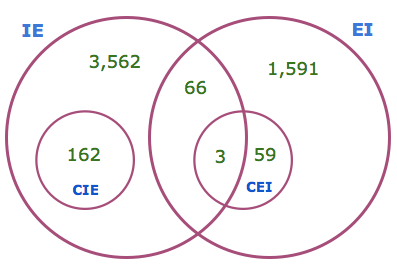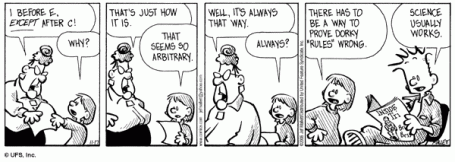The Weird I Before E Rule
November 15, 2014 at 3:51 am 17 comments
I’ve always hated the I before E except after C rule. My hatred is simple: a rule is a “prescribed direction for conduct,” and, as far as I’m concerned, it should be accurate very close to 100% of the time.
The Triangle Inequality? That’s a rule that always works.
The sum of the angles of a triangle? It’s 180°, 100% of the time.
Ceva’s Theorem? Completely worthless, to be sure, but also completely correct.
But the I before E rule? I wasn’t sure how often it was inaccurate, but it only took a few seconds to come up with myriad counterexamples:
- weird
- science
- neighbor
- rein
- pricier
- deficient
- eight
That’s the thing, right? Math rules always work. Else we wouldn’t call them rules. But grammarians, philosophers, artists — pretty much anyone with a liberal arts degree — will call anything a rule that works some of the time.
So with some help from MoreWords, I created the following Venn diagram:

Let me ‘splain. No, wait… that would take too long. Let me sum up.
There are 5,443 words that contain either EI or IE. Of those,
- 3,562 correctly contain IE not following C
- 62 correctly contain EI following C
That is, of the 5,443 words containing EI or IE, 1,591 words violate the rule by having EI without a C in front of it, and 162 words violate the rule by having IE with a C in front of it.
Which is to say, only 66.6% of the words that contain either EI or IE adhere to the rule I before E except after C.
Put another way, the rule is total bullshit.
These numbers are consistent with an analysis from Language Log, which looked at about 8.7 million words randomly pulled from a month of the NY Times. It was found that 174,716 words contained EI or IE, but only 114,070 words correctly followed the rule, which means the rule held about 65% of the time.
One of the readers of Language Log commented that the rule works with the following amendment:
When the sound is long E,
it’s I before E,
except after C.
I’ll call bullshit.
I didn’t even have to think to come up with a list of words for which that modified rule fails:
- seize
- leisure
- either
- neither
- protein
Speaking of rules…
Philosophy is a game with objectives and no rules.
Mathematics is a game with rules and no objectives.
— AnonymousMathematics is a game played according to certain simple rules with meaningless marks on paper.
— David Hilbert
Entry filed under: Uncategorized. Tags: accurate, grammar, I before E, language, rule, Venn diagram.
17 Comments Add your own
Leave a comment
Trackback this post | Subscribe to the comments via RSS Feed



1. xander | November 15, 2014 at 3:07 pm
xander | November 15, 2014 at 3:07 pm
I take it you consider hyperbolic spaces to be an abomination, then? 😛
2. venneblock | November 16, 2014 at 8:31 am
venneblock | November 16, 2014 at 8:31 am
So much so that I avoid them at all costs. I can’t remember the last time I played an ultimate frisbee game in hyperbolic space.
3. a | November 29, 2014 at 1:07 am
a | November 29, 2014 at 1:07 am
…the universe is locally hyperbolic.
4. gbark321 | November 16, 2014 at 8:23 am
gbark321 | November 16, 2014 at 8:23 am
I feel like the problem with the I before E “rule” really has to do with the fact that the English language is full of exception after exception after exception. What if we instead called it the I before E *guideline*? Even though the guideline is wrong 33.3% of the time (I really love your use of the venn diagram and using maths to “prove” the rule incorrect! It’s really cool.), it still works 2/3 of the time. Which is good enough for it to be helpful for children learning to spell or ESL students.
I agree– it’s a BS rule. But it’s a really helpful guideline! 🙂
5. venneblock | November 16, 2014 at 8:30 am
venneblock | November 16, 2014 at 8:30 am
Sure, call it a guideline or whatever you want… but I still think a third incorrect is too high to be helpful. If you read a story with one-third of all words spelled incorrectly, you’d suspect the author of being illiterate, no?
But you’re right. The English language is a hodge-podge of transmogrifications from other languages, so it’s no surprise there isn’t one rule to guide us, one guideline to rule them all.
6. John | July 18, 2016 at 5:36 pm
John | July 18, 2016 at 5:36 pm
It’s not maths, it’s arithmetic.
7. tennesseejeff | November 28, 2014 at 10:26 pm
tennesseejeff | November 28, 2014 at 10:26 pm
Well, the way I originally heard it was “I before E except after C or when sounded as A as in neighbor or weigh”
8. venneblock | November 29, 2014 at 9:53 pm
venneblock | November 29, 2014 at 9:53 pm
Unfortunately, I don’t have an easy way to search for long A words — as I said, http://www.morewords.com was my research tool, so what I could do was limited. So I can’t analyze how much of a change the “like ‘ay’ as in ‘neighbor’ and ‘weigh'” extension changes things, but I can think of several exceptions to the long-A part: feisty, weird, heist, cleidoic.
9. spacechimplives | November 29, 2014 at 1:21 am
spacechimplives | November 29, 2014 at 1:21 am
You forgot the part “or when sounding like “ay” as in “neighbor” and “weigh”
10. venneblock | November 29, 2014 at 9:55 pm
venneblock | November 29, 2014 at 9:55 pm
See my response to Tennessee Jeff about this. And for some fun, check out what people at http://www.reddit.com/r/math/comments/2np7di/the_spelling_rule_of_i_before_e_except_after_c/ are saying about this post. I’ve apparently set off a firestorm!
11. Thomas Markov | November 29, 2014 at 9:42 am
Thomas Markov | November 29, 2014 at 9:42 am
To be fair, the sum of the angles of a triangle only works for a EUCLIDEAN triangle.
12. venneblock | November 29, 2014 at 9:57 pm
venneblock | November 29, 2014 at 9:57 pm
Agreed. Sometimes I get too concise (or lazy) when I’m trying to be funny. Just sloppy on my part. (But please believe that I know it only works in Euclidean space.)
13. I before E except after C | Unsupervised Learning | November 29, 2014 at 2:37 pm
[…] recent post on Patrick Vennebush blog Math Jokes for 4 Mathy Folks asserted that the rule of thumb “I […]
14. venneblock | November 29, 2014 at 10:02 pm
venneblock | November 29, 2014 at 10:02 pm
This. Is. Awesome.
I love the “P before E except after C” rule! Nice.
15. 11 Commonly Misspelled Words in Matheamtics | Math Jokes 4 Mathy Folks | July 30, 2015 at 9:16 am
[…] : the ei takes on a long a sound, despite the i before e rule, and then there’s a silent gh. Yeah, lots of opportunities for goofing up this one. No one […]
16. homeslicez | August 4, 2018 at 7:02 am
homeslicez | August 4, 2018 at 7:02 am
Yes it’s bullshit. And is a terrible thing to teach kids, and me, as a kid long ago, since I actually tried to abide by it.
But this is also bullshit: “But grammarians, philosophers, artists — pretty much anyone with a liberal arts degree — will call anything a rule that works some of the time.”
What the fuck. You choose this topic to use your science degree (I assume, I’m only just now googling things) to get over? That’s not just humblebrag, its humblespite. Fuck you and your math degree, bitch.
17. venneblock | August 7, 2018 at 2:37 pm
venneblock | August 7, 2018 at 2:37 pm
No, I didn’t choose this topic to “get over.” I chose this topic because I enjoy using math to explain (and make fun of) the world.
Your comment seems to indicate that you’re new to this site, which may be why you’re unaware that I don’t make fun of only liberal arts majors… I make fun of everyone. Here are some other jokes I’ve used on this blog over the years:
Every group has their quirks, and I’m an equal opportunity insulter. I’m sorry that you perceived it as hate and not what it is — humor.
As for fucking my math degree… careful, you’re gonna get paper cuts on your junk.